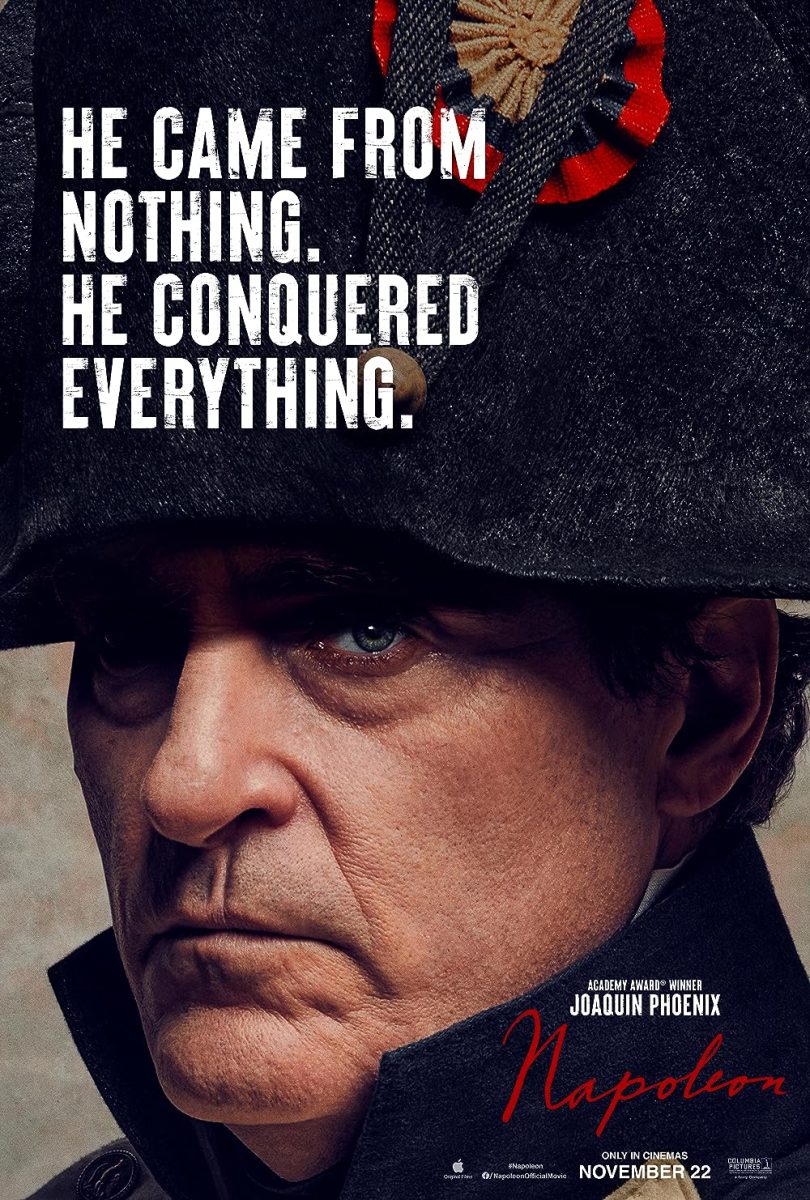While I was home over break, I saw Ridley Scott’s “Napoleon” (2023), starring Joaquin Phoenix as Napoleon Bonaparte and Vanessa Kirby as Napoleon’s lover Josephine. Through the film’s two-and-a-half-hour runtime, Scott guides us from Napoleon’s rise within the French military to the final moments of his life.
Scott is a veteran of the historical epic genre. He has had much success with films like “Gladiator” (2000), which won Best Picture at the Academy Awards, “Kingdom of Heaven” (2005) – a film which was initially released to mixed reviews but when a longer director’s cut was released, most of the critiqued components were not present in the film – and the “The Last Duel” (2021), a film I found very moving and relevant. Scott takes all this experience and brings it to “Napoleon,” crafting a movie with a grand scope that still manages to keep the focus on the title character. David Scarpa, with whom Scott collaborated on “All the Money in the World” (2017), does a good job in his script of putting the larger-than-life character of Napoleon on the screen and making him feel human.
The two main performances by Phoenix and Kirby are both brilliant in their own ways. Phoenix is able to conjure a menacing and powerful presence with Napoleon, portraying a man with a huge ego who is still very vulnerable below the surface. Kirby steals every scene she is in as Josephine. The film intends to convey that Josephine was Napoleon’s anchor and motivating force, and Kirby plays into this concept exquisitely.
Where “Napoleon” really shines is in the technical aspect of its filmmaking. Dariusz Wolski’s striking and bold cinematography brings large-scale battle sequences, such as the famous Battle of Waterloo, to life. Some frames contain hundreds of men on horseback charging one another, and seeing the film in a theater on a large screen is incredibly immersive and impressive. Editor Claire Simpson does a great job of navigating a story that takes place over a couple of decades. The score by Martin Phipps also adds the perfect touch to all the emotional and action scenes. Furthermore, the set, sound and costume design are all exceptional and feel authentic to the time period.
However, “Napoleon” is not a perfect film. At times, it can be unintentionally funny, taking the viewer out of the experience and seriousness of the rest of the movie. Also, even though the film runs for over two and a half hours, most scenes felt either cut short or rushed, and sometimes it felt like entire scenes were missing that would’ve helped elevate the dramatic moments. This is most likely because, as Scott confirmed in an interview, the film is intended to be around 4 hours long — something we will be able to see when it is released on streaming platforms. This causes the theatrical version of the film to fail to reach its potential, and doesn’t allow it to give the audience the best theater-going experience they could have had.
While at times rushed and not given ample time to breathe, “Napoleon” is a fascinating and engrossing look into one of the most complex figures in history — and it taught me that I shouldn’t invade Russia during the winter.























































































































